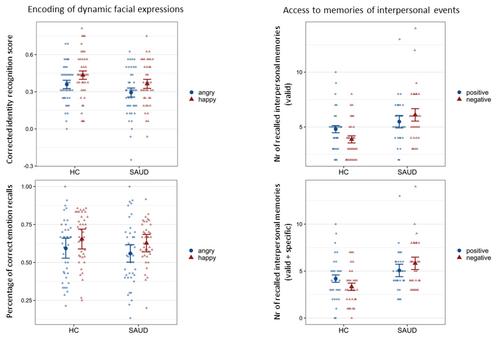Social episodic memory in severe alcohol use disorder: Positive encoding bias and negative bias in accessibility of interpersonal information
Abstract
Background
Alterations in higher-order social cognition are well documented in individuals with severe alcohol use disorder (SAUD). However, the basic mechanisms underpinning them are not well understood. This knowledge gap hampers the development of targeted therapeutic interventions. Here, we investigated whether individuals with SAUD show abnormalities in social episodic memory processes, which may represent relevant candidate mechanisms for alterations in social cognition.
Methods
Recently detoxified patients with SAUD and matched healthy controls (HCs) completed two experimental tasks. We first used a Social Recognition Task in 40 SAUD patients and 40 HCs to measure the participants' ability to implicitly memorize the facial identity and emotion of novel interpersonal cues (i.e., dynamic facial expressions of anger and happiness). We then used a Social Memory Accessibility Task in 29 SAUD patients and 30 HCs) to measure participants' access to and fluency for already existing social memories by asking them to retrieve as many specific positive and negative interpersonal events as possible within equal time limits.
Results
In the Social Recognition Task, we found that, compared to HCs, patients with SAUD had a globally lower recognition performance for the facial identities of novel social stimuli, but a preserved bias toward positive information. Conversely, in the social memory accessibility task, patients showed greater access to and fluency for negative interpersonal memories than controls (no group differences were observed for positive ones), resulting in a negative accessibility bias.
Conclusions
This exploration of episodic social memory in individuals with SAUD showed (1) a preserved bias for the encoding of positive versus negative novel social information, and (2) greater access to negative than positive interpersonal memories. These results enhance our understanding of socio-affective processing in individuals with SAUD and identify social memory alterations that may contribute to social cognition and interpersonal difficulties.


 求助内容:
求助内容: 应助结果提醒方式:
应助结果提醒方式:


